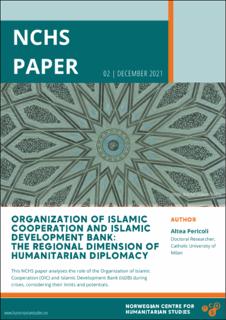The Organization of Islamic Cooperation and the Islamic Development Bank: The regional dimension of humanitarian diplomacy
Research report
Permanent lenke
https://hdl.handle.net/11250/2834277Utgivelsesdato
2021-12-01Metadata
Vis full innførselSamlinger
- Publications [1488]
Originalversjon
Norwegian Centre for Humanitarian StudiesSammendrag
This paper analyses the role of the Organization of Islamic Cooperation (OIC) and Islamic Development Bank (IsDB) during crises, considering their limits and potential. Besides the diplomatic role in negotiating and mediating access to aid for vulnerable populations, another concept emerges in this analysis: the financial aspect of humanitarian diplomacy. While actors at different levels have to negotiate for access to aid, at the same time this access requires financial sustainability that can contribute to improving the resilience of vulnerable communities. For this purpose, OIC and IsDB can mobilise innovative financing mechanisms when they intervene for ensuring access to aid for conflict-affected populations and play a crucial role in creating a space of dialogue between the international and local levels. Altea Pericoli is a Doctoral Researcher at the Catholic University of Milan and a visiting PhD at Durham University, the Doha Institute for Graduate Studies, and the Chr. Michelsen Institute (CMI). This paper has been published by the Norwegian Centre for Humanitarian Studies (NCHS), a joint initiative of CMI, the Norwegian Institute of Interational Affairs (NUPI) and the Peace Research Institute Oslo (PRIO). The NCHS promotes humanitarian research and brings together scholars, practitioners and policy makers to facilitate discussion on humanitarian related issues. This publication is part of the “Humanitarian Diplomacy: Assessing Policies, Practices and Impact of New Forms of Humanitarian Action and Foreign Policy” project funded by the Research Council of Norway (project number 286859) and led by Antonio De Lauri at CMI. Bibliography AAOIFI. (2015). Shariah Standards Accounting and Auditing Organization for Islamic Financial Institutions, Kingdom of Bahrain. Adiguzel, F. S. & Kuran, T. (2021). The Islamic Waqf: Instrument of Unequal Security, Worldly and Otherworldly. Economi
